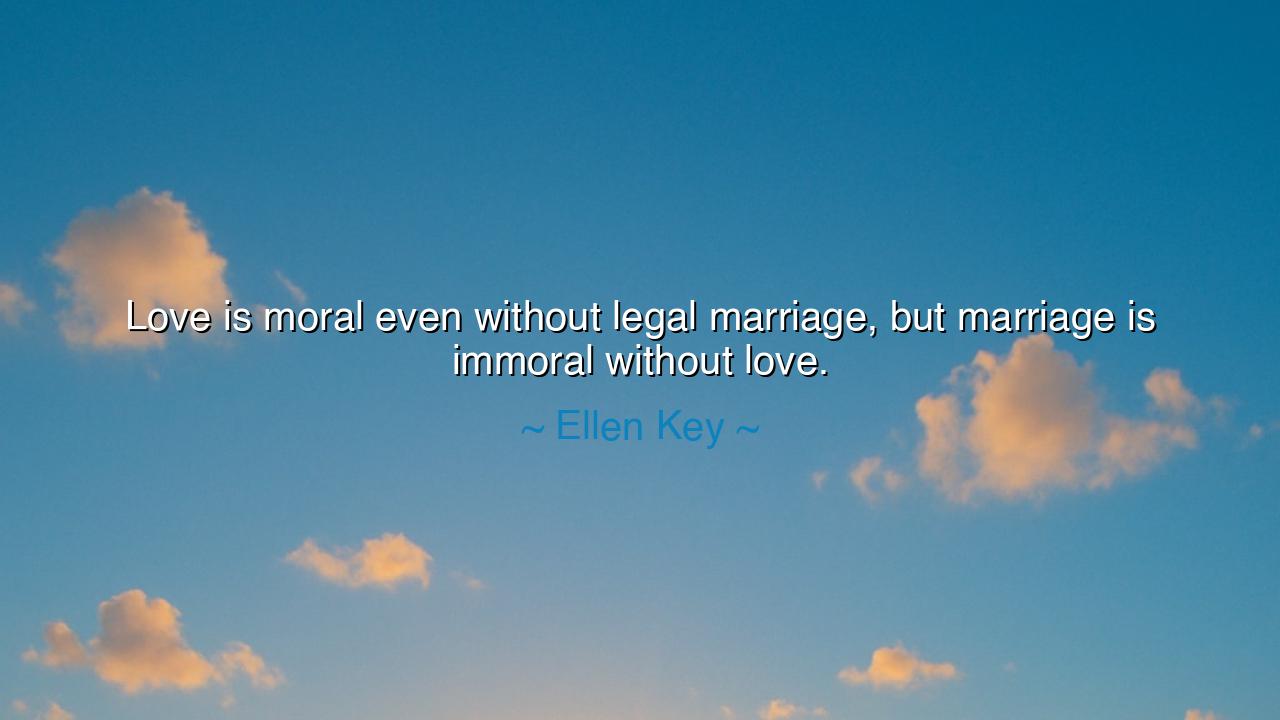
Love is moral even without legal marriage, but marriage is






The words of Ellen Key, “Love is moral even without legal marriage, but marriage is immoral without love,” fall like a hammer upon stone, breaking illusions and awakening the soul. She speaks not merely of contracts or ceremonies, but of the eternal fire that binds two spirits in truth. Love, she declares, is holy in itself. It needs no seal of law, no stamp of kings, no blessing of courts. For when hearts meet in purity, loyalty, and devotion, they are already joined in the eyes of heaven and of conscience. But when a union is made only by custom, wealth, or the chains of duty—when there is marriage without love—then it becomes a falsehood, a mask, a betrayal of the sacredness of human affection.
The ancients knew this truth. In Rome, marriages were often arranged for power, not passion, and many noblewomen, bound to loveless unions, sought solace in secret affairs. They were trapped by the law, yet their hearts cried out for freedom. Ellen Key’s voice echoes across time, proclaiming that the morality of love lies not in the contract, but in the sincerity of the bond. The law can bind hands, but only love can bind souls. Without it, even the most splendid marriage is a prison gilded in gold.
Consider the story of Heloise and Abelard. Their love burned with brilliance, yet the Church and society judged them harshly, forcing them apart. Though they were not legally wed in the manner the world demanded, their letters reveal a union of spirit so deep that centuries later, we still tremble at their words. By contrast, how many kings and queens, joined by treaties and dynasties, lived in marriage without love, their homes filled with coldness, their heirs born not of joy but of obligation? The lesson is clear: passion, loyalty, and tenderness sanctify a bond far more than any parchment signed beneath the gaze of officials.
The power of Ellen Key’s teaching is that it restores human dignity. For if two souls walk together in love, even if society refuses them a license, their devotion is still noble, moral, and pure. But if two people live under one roof, joined only for convenience, wealth, or fear of shame, they commit a greater sin: they insult the truth of love, making marriage itself a mockery. To live loveless yet bound is to deceive not only one another, but also oneself.
Let us not mistake her meaning: she does not call for chaos, nor for the rejection of vows. She calls us to recognize that the foundation of marriage is love. Where it exists, marriage is blessed and radiant, whether acknowledged by the state or not. Where it is absent, all ceremonies are hollow, and the union becomes a lie. The law is a servant, not a master, of love.
From this we learn a sacred lesson: seek always the truth of the heart. Do not enter into union for status, fear, or the hunger of possessions. Let your joining be born of mutual respect, shared vision, and the fire of affection. If you are already bound in a loveless marriage, do not bury your heart in silence, but strive to awaken love again, or to free yourself so that both souls may find light. For to pretend at love is to waste the years that cannot return.
And so, children of tomorrow, when you look upon this world of fleeting pleasures and pressing obligations, remember Ellen Key’s words. Choose love first, for love is the seed from which marriage grows. Without it, you build your house upon sand, and the storm will wash it away. With it, even the humblest dwelling becomes a palace of joy.
Therefore, take these actions: when you give your heart, give it with honesty; when you vow your loyalty, let it be because you cherish, not because you fear; and when you bind your life to another, ensure that it is love—true, steadfast, and moral—that ties the knot, and not merely the cold ink of law. In this way, you will walk the path of truth, and your union will stand as a beacon for generations yet unborn.






AAdministratorAdministrator
Welcome, honored guests. Please leave a comment, we will respond soon